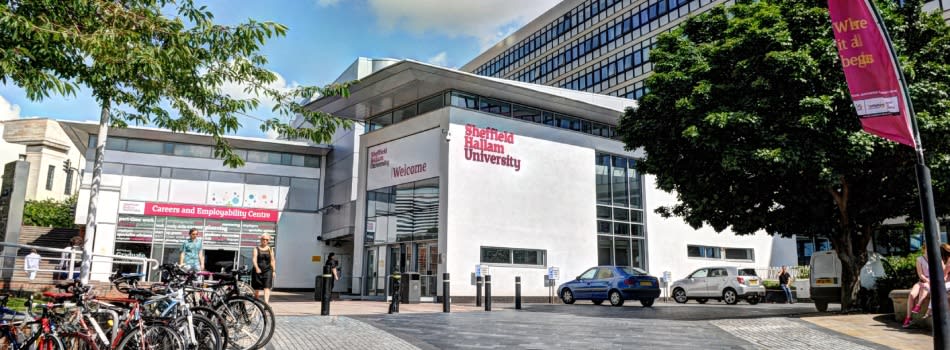The Industry and Innovation Research Institute (I2Ri) draws on talents, expertise and facilities across Sheffield Hallam University. The vision is to be the leading provider of applied research excellence delivering materials, computing, science and engineering innovations meeting the development needs of industry.
This project is part of a Graduate Teaching Assistants scheme, in which the successful applicant will undertake certain teaching duties associated with the student experience, in addition to working towards a PhD qualification. They contribute to up to 180 hours of support for research or teaching related activity per academic year. This activity forms part of the scholarship award and there is no additional payment.
PhD Research Topic
Uveal melanoma (UM) is a rare adult eye cancer affecting approximately 5-6 individuals per million annually. UM arises from structures in the middle layer of the eye; the iris, choroid or ciliary body. The treatment of metastatic uveal melanoma remains a significant challenge due to the diffuse dissemination of UM cells in the liver in most affected patients, and a lack of demonstrable efficacy of systemic treatments. Current laboratory models used for pre-clinical drug testing include UM cell lines grown in vitro in a 2D setting and patient-derived xenograft (PDX) models using human UM material transplanted into immunocompromised mice. 2D cultures fail to reproduce many of the physiological aspects of the tumour microenvironment (TME), leading to drug responses very dissimilar to those subsequently observed in clinical settings, and PDX models are disadvantaged by their low engraftment rate, and high cost. In contrast, 3D-cell culture techniques, which can be established reproducibly and relatively rapidly, have the potential to bridge the gap between 2D in vitro culture and animal models, assuming they more faithfully mimic the in vivo TME of UM.
The successful applicant will have access to an exclusive Waters Select Series imaging suit which includes the SELECT SERIES MRT matrix-assisted laser desorption ionisation mass spectrometry imaging (MALDI-MRT-MSI), SELECT SERIES Cyclic IMS desorption electrospray mass spectrometry imaging (DESI-MS) and Xevo TQ-XS liquid chromatography electrospray ionisation tandem mass spectrometry (LC-ESI-MS/MS). These sophisticated instruments will be highly advantageous for analysis of complex biological samples given their high spatial resolution capability.
This project brings together experts in UM and multimodal mass spectrometry imaging to undertake the characterisation of metabolites and N-glycans in patient samples and to compare this with in vitro 3D models of the disease, as a novel avenue for the identification of agents that can target metabolic vulnerabilities.
Eligibility
Applicants should hold a 1st or 2:1 Honours degree in a related discipline. A Master’s degree in a related area is desirable. We are offering this as a full-time PhD scholarship. We welcome applications from all candidates irrespective of age, pregnancy and maternity, disability, gender, gender identity, sexual orientation, race, religion or belief, or marital or civil partnership status.
Information for International applicants
We have a mandatory English language requirement of IELTS 7 with a score of at least 6.5 in all test areas, or equivalent language qualification, for all applicants to whom English is not their first language. This qualification should have been taken within the last two years.
Further information about equivalent English language qualifications can be found here
Generally, the shortfall between the Home and International fee, currently around £10,300 per year, will need to be covered by the student for the duration of the studentship. As part of the Sheffield Hallam PhD scholarship programme, additional funding may be made available to assist International students with this fee gap. This additional funding is limited, though, and will only be offered to exceptional International applicants. Allocation of this additional funding will be based on information obtained through the standard GTA recruitment process, and no additional application will be required.
How to apply
We strongly recommend you contact a member of the supervisory team before making an application.
To apply for this GTA scholarship, please use our online application form.
You must ensure that you upload:
1. A letter of intent (1 page maximum) detailing why you are interested in the project and how your experience and background can make you the best candidate for this project. Please also identify potential areas you can contribute to within the teaching departments associated with this project. (Please upload this in place of a proposal)
2. Two letters of reference, one must be from an academic and both must be dated within the last 2 years (if you are not able to collate these by the application deadline please include referee details and these can follow afterwards).
3. Copy of your highest degree certificate (if available).
4. Non-UK applicants must submit IELTs results (or equivalent) taken in the last two years and a copy of their passport.
The closing date for all applications is 11:59pm (UK time) 12 May 2023. Ensure that applications are submitted before the deadline as late applications will not be accepted.
Interviews are scheduled for: 6 June 2023 onwards
Further information about our research degrees can be found here
An Overview of the GTA scheme can be found here
The Conditions of the Award can be found here

 Continue with Facebook
Continue with Facebook




